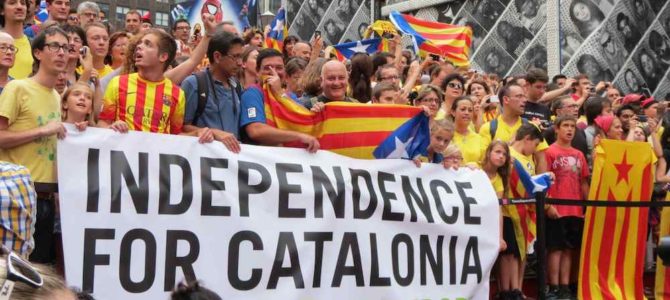
The autonomous region of Catalonia has once again called for a referendum for secession from Spain, and all hell is breaking loose. Although the vote is still two weeks away, this week has seen a marked increase in tension and conflict between the two sides that’s quickly reaching a boiling point. The government in Spain, which calls the planned vote illegal, has frozen Catalonia’s access to public funds so that they can’t be spent on organizing the referendum. It is also trying to shut down its access to ballot boxes, although the Catalan government says it has 6,000 of them hidden away.
On Wednesday, the Spanish military arrested 14 high ranking Catalan officials and raided 41 Catalan regional government departments across the region. They have also raided newspapers to look for documents having to do with the referendum, following a judge’s order. This caused more than 40,000 protesters to take to the streets of Barcelona on Thursday night, which then provoked the Spanish government to send troops into the city. Tens of thousands are gathering again in the city today for more protests.
Demonstrating the severity of the situation, the government in Madrid had attempted to send 4,000 police officers to the region on Thursday in police boats which were meant to dock in Catalonia to deal with the escalating situation, but the boats couldn’t dock—the port workers wouldn’t cooperate. They either boycotted or refused docking access to the ships. The government responded by hiring ferries to be moored in the Port of Barcelona as temporary housing for police.
This Isn’t The First Time Catalonia Has Sought Independence
Catalonia has long called for independence from Spain. As recently as 2014, it tried to hold a similar independence referendum. At that time, the Spanish government pushed back, calling the vote illegal. That caused Catalan leaders to rebrand the vote as a “participation process” to see how much support the Catalan government had for political independence. Catalan leaders still faced legal consequences for holding that vote, something that was presumably meant to scare Catalonia off from holding another referendum.
That clearly didn’t work. This time around, Catalonia is much more defiant and is not taking no for an answer, which seems to be part and parcel of the populism that’s been sweeping Europe in the last couple of years. Now, it appears Catalonia’s boldness could boil over into the kind of civil unrest that Western Europe hasn’t seen in decades.
According to the Catalan National Assembly, the Spanish government “made a big mistake; we wanted to vote and they declared war.” Catalan leaders say what they really want, more than independence, is democracy: “The issue that is at stake today isn’t the independence — or not — of Catalonia,” Raül Romeva, Catalonia’s foreign affairs chief, told a group of foreign correspondents in Madrid on Wednesday, “but democracy in Spain and the European Union.”
Catalonians Want Choice More Than Independence
This reflects recent opinion polls that show support for independence in Catalonia has actually dropped; what people really want is simply the right to make a decision concerning independence themselves, democratically. It also highlights the increasing frustration with the EU and a rising sentiment that EU leaders are making decisions for member states without being held accountable in the way leaders usually are in a democracy—by facing re-election.
The government in Spain looks nervous. It doesn’t want its sovereignty challenged by the vote taking place. If the vote takes place under official Catalan auspices, it’s a tacit acknowledgement that Catalonia is a separate entity, perhaps even with sovereign rights. So the government in Madrid is coming down like a hammer, which only makes the Catalan people look more sympathetic.
Leaders of the Catalan independence movement say that Catalan lawmakers will honor the outcome within 48 hours of the vote, regardless of which way it goes, meaning they will declare independence if that’s what the voters want. If that happens, what next?
Beyond the clumsiness of the Spanish government’s handling of the affair, and the undercurrent of frustration with the high-handedness of the EU, the Spanish-Catalan dispute highlights a fundamental contradiction at the heart of Wilsonian internationalism: how do you resolve the tension between the declaration that ethnic groups have a right to self-determination with the idea that countries have the right to maintain their borders and sovereignty?









